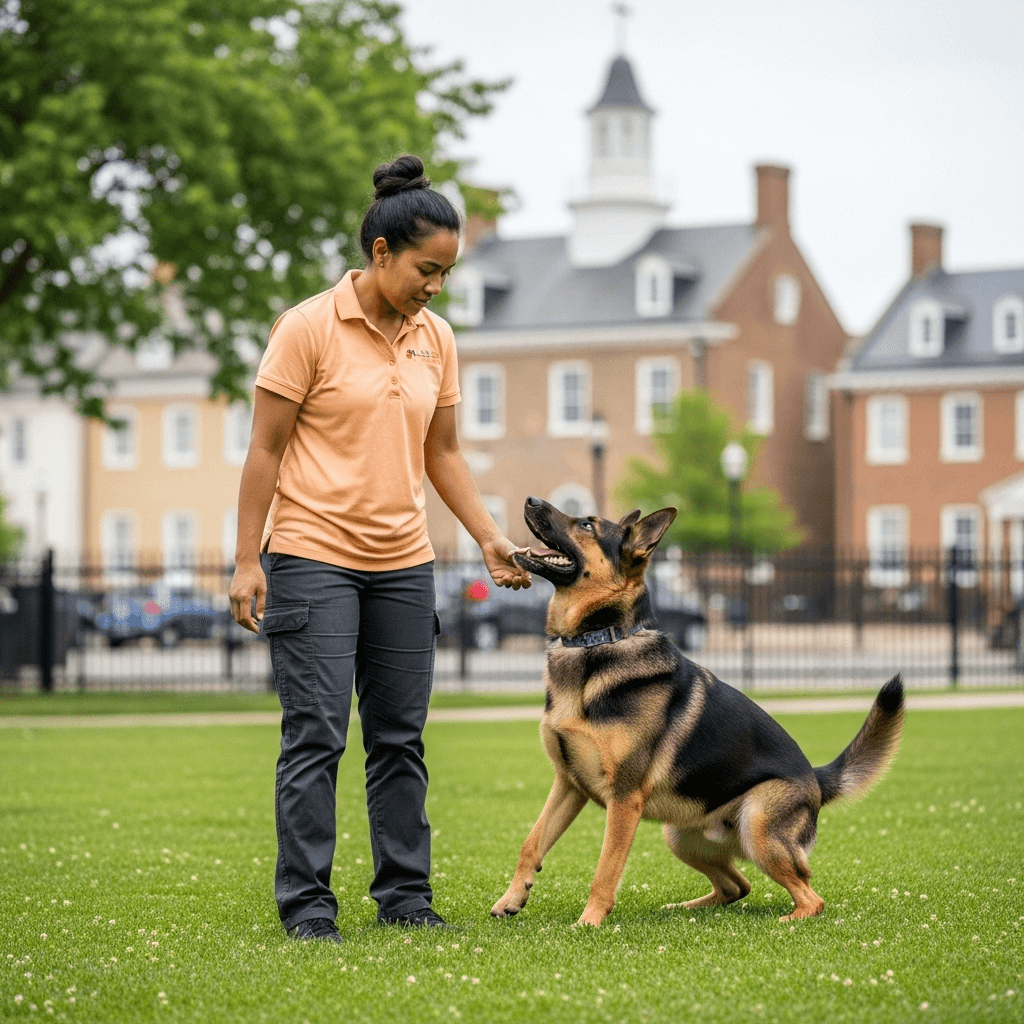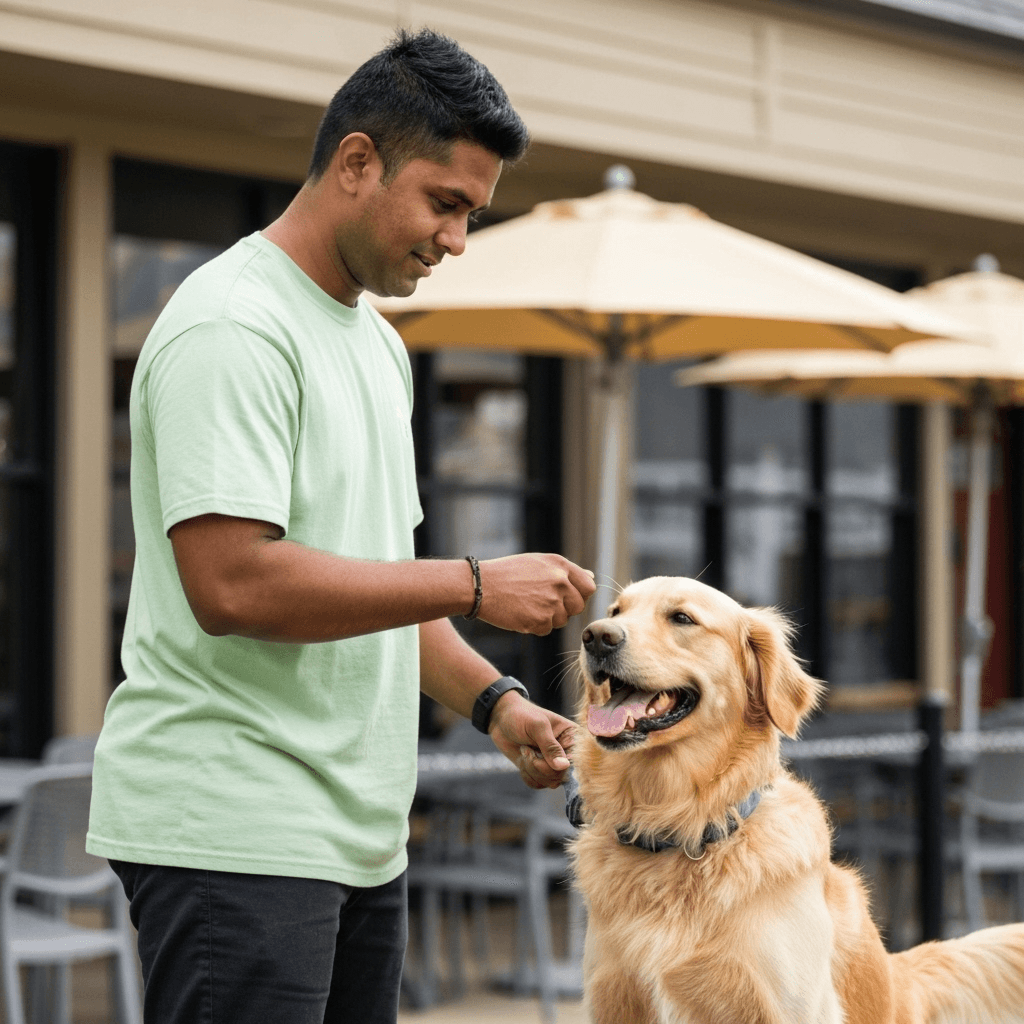Your Complete Guide to Choosing a Dog Trainer in Williamsburg VA and Surrounding Areas
Living with a dog in Williamsburg means navigating Colonial Williamsburg’s pedestrian areas, handling weekend crowds near Merchants Square, and managing the tourist energy that fills the Historic Triangle. Your dog needs to stay calm around costumed interpreters, horse-drawn carriages, and visiting families exploring the area’s museums and historic sites.
Since Williamsburg operates as an independent city in Virginia, local regulations follow city ordinances rather than traditional county rules. When you find a trainer who understands these local details, you’ll get better results both at home and out in your community.
How to Choose the Right Trainer
Start by looking for someone who uses positive reinforcement training and can set realistic goals for your Williamsburg lifestyle. This means your dog should learn to walk calmly past tourists on Duke of Gloucester Street, stay focused near historic demonstrations, and handle outdoor dining areas without begging or pulling.
Credentials give you a quick way to compare trainers’ experience levels. Common dog trainer certifications include KPA-CTP, CPDT-KA, or IAABC-CDBC for behavior problems. If your dog has serious aggression issues, look for someone with CBCC-KA or a science-based program like CTC.
In-home dog training works great for puppy manners, door greetings, and neighborhood leash skills. Group classes make sense once your dog can focus around other dogs, especially before you try busy spots like New Town or the Colonial Williamsburg Visitor Center.
Common Dog Training Methods Explained

Reward-based methods build the trust you want while creating lasting behavior changes. They also help your dog learn to stay calm in Williamsburg’s unique mix of residential neighborhoods and tourist areas.
Basic obedience covers sit, down, stay, place, recall, and leash training so your dog can handle walks, restaurant patios, and park visits without pulling or jumping on people. These skills matter more when you’re maneuvering through crowded sidewalks or waiting politely while you chat with neighbors.
Puppy training focuses on socialization, potty training, bite control, crate comfort, and early leash work. Starting with short, positive sessions prevents bad habits from forming in the first place and helps your puppy adjust to the sounds of fife and drum corps or carriage wheels on brick streets.
Behavior modification addresses fear, reactivity, resource guarding, or separation anxiety through careful desensitization and counterconditioning. For serious cases, ask if your trainer works with local veterinarians to rule out medical issues first.
Private lessons and in-home sessions let you customize everything around your daily routines, while day training can speed up results when you’re short on time. Day training means a professional dog trainer works with your dog during the day and then teaches you how to maintain the progress.
Dog training classes help your dog practice good manners around other dogs and people. The best classes give dogs plenty of space, screen participants carefully, and teach calm behavior rather than just excitement.
Specialized training like therapy dog training or service dog training requires extra structure, public-access skills, and a very clear step-by-step program. Williamsburg’s tourism industry creates many opportunities for therapy dogs to visit museums, assisted living facilities, and educational programs.
Stay away from trainers who use fear, intimidation, or pain to get results. Humane methods are safer for everyone, easier to maintain long-term, and much better for keeping peace with your neighbors.
Average Cost of Dog Training in Williamsburg VA (Updated for 2025)
Prices around Williamsburg depend on the trainer’s experience, how long training sessions last, and where the training happens. Here’s what most local pet owners are paying in 2025.
| Service Type | Average Cost (Williamsburg Area) |
|---|---|
| Puppy classes (4-6 weeks) | $160-$290 total |
| Group obedience classes (4-6 weeks) | $170-$310 total |
| Private lessons (60-90 min) | $115-$200 per session |
| In-home coaching packages (4-6 visits) | $440-$950 total |
| Day training (trainer works your dog + handoff) | $475-$1,000 per week |
| Behavior consult for reactivity/anxiety (initial) | $160-$275 |
| Board and train (2-4 weeks) | $2,100-$4,800 total |
You’ll probably pay extra travel fees if you live in surrounding areas like James City County or York County, and expect higher rates for complex behavior work. Make sure you understand what’s included, how the trainer tracks progress, and whether they offer a free consultation before you sign up.
Questions to Ask a Potential Dog Trainer
- What training methods do you use, and how do you keep sessions positive and low-stress?
- What credentials do you have, like CPDT-KSA or similar certifications? Do you keep up with continuing education?
- How will you customize the training program for my dog’s specific needs and our Williamsburg lifestyle?
- Do you offer in-home visits, group classes, or day training, and which approach fits my goals best?
- How will we measure my dog’s progress and know when to add more distractions?
- What are the total costs, including any travel fees, and what’s your cancellation policy?
- Do you carry liability insurance, and can you show me proof?
- For behavior problems, will you work with my veterinarian if needed?
- What should I practice between our sessions to help my dog keep improving?
- Have you worked with dogs who need to handle tourist areas, crowds, and historic sites?
Local Williamsburg Rules and Considerations
Williamsburg enforces leash laws and nuisance rules to keep parks and neighborhoods safe for everyone. As an independent city in Virginia, Williamsburg follows state public health requirements too.
Leashes are required in all public spaces except inside designated dog parks. Keep a standard 6-foot leash with you for city parks, trails, and public areas.
Virginia law requires current rabies vaccination for all dogs. You can get these through local veterinarians, and find more details through the Virginia Department of Health.
Excessive barking can be considered a nuisance under city noise ordinances, so work with your trainer on alert barking and separation anxiety before neighbors start complaining. If your trainer wants to use city parks for commercial dog training services, they may need permits and proof of liability insurance.
Virginia doesn’t require special licenses for expert dog trainers, but trainers should carry liability insurance to protect both clients and themselves during sessions. If a business boards dogs for payment as part of board and train programs, they must register with the Virginia Department of Agriculture and Consumer Services under the state’s kennel regulations.
The Williamsburg Animal Shelter provides resources for lost pets, microchips, licensing information, and other city services.
Local Williamsburg Resources for Dog Owners
These spots give you great places to practice polite manners, work on recalls, and provide safe enrichment for your dog. Always follow the posted rules and etiquette guidelines.
- Freedom Park Dog Park offers a fenced area with separate sections for large and small dogs, making it perfect for socialization and off-leash recall practice during quieter times.
- Waller Mill Park provides trails and open spaces where leashed dogs can practice focus around joggers, cyclists, and families.
- New Quarter Park features leashed trails through wooded areas and marshland, giving you natural distractions for building your dog’s attention skills.
- York River State Park welcomes leashed dogs on most trails and offers varied terrain for training walks and building stamina.

FAQs
How much does in-home dog training cost?
Most Williamsburg trainers charge $115-$200 per in-home visit, with discounts available when you buy packages. Behavior problems typically start at the higher end of that range.
Is in-home dog training worth it?
Absolutely, because you’re working on problems exactly where they happen. Your trainer can fix door manners, jumping on guests, counter-surfing, and yard reactivity right at home, then step outside to practice leash skills on your actual neighborhood sidewalks.
Can you pay someone to house train your dog?
Yes, many trainers offer puppy programs that include potty training, crate routines, and daily schedules. Day training can speed up the process while teaching you how to maintain the progress between sessions.
What is the 3-3-3 rule for dog training?
This is a helpful timeline for new or adopted dogs: expect about 3 days for your dog to decompress, 3 weeks to learn your routines, and 3 months to feel completely settled. Good training plans work with this natural adjustment period rather than rushing results.
How long will it take to reach my training goals?
Most puppies and friendly adult dogs show solid progress within 4-8 weeks if you practice daily. Fear, reactivity, or aggression typically requires several months of careful behavior modification with gradual increases in difficulty.
What should I bring to group classes?
Pack a flat collar or harness, a 6-foot leash, high-value treats, water, and current vaccination records if your trainer requests them. Leave retractable leashes at home for safety reasons.
What’s the leash law in Williamsburg?
Dogs must be leashed and under control in all public areas, except inside designated off-leash dog parks. Keep that 6-foot leash handy for city parks, trails, and especially around Colonial Williamsburg’s pedestrian areas.
Do I need a dog license in Williamsburg?
Yes, the City of Williamsburg requires dog licenses. You’ll need proof of current rabies vaccination to obtain your license through the city. Contact the Williamsburg Animal Shelter for licensing information and fees.
What shots does my dog need in Virginia?
Rabies vaccination is required throughout Virginia. Your veterinarian may also recommend distemper-parvo, bordetella, and leptospirosis based on your dog’s lifestyle and exposure risks.
Are dog trainers required to be licensed in Williamsburg or Virginia?
No special trainer licenses exist in Virginia. Trainers follow normal business regulations, but if they offer board and train services, their facility must register with the Virginia Department of Agriculture and Consumer Services under state kennel regulations.
Where can I practice off-leash recall?
Use the fenced dog park at Freedom Park to keep things safe and legal. Try visiting during quieter hours when you’re starting out so your dog can build confidence without too many distractions.
Which dog parks allow training around Williamsburg?
Freedom Park Dog Park allows off-leash play within its fenced areas and is the main designated dog park in Williamsburg. You can practice recalls, socialization, and calm greetings here as part of your training program.
What beaches or trails allow dogs for training?
While Williamsburg doesn’t have beaches within city limits, leashed dogs are welcome on trails at Waller Mill Park, New Quarter Park, and York River State Park. These locations are perfect for teaching calm focus around wildlife, joggers, and families.
How do I help my dog handle the crowds in Colonial Williamsburg?
Start by building strong foundation skills in quieter areas first. Practice leash walking, focus exercises, and calm behavior at home and in your neighborhood before gradually working up to busier locations. Keep training sessions short and positive, and always have high-value treats ready to reward your dog for staying calm around tourists, carriages, and performers.
Can my dog visit Colonial Williamsburg?
Leashed dogs are generally allowed in outdoor areas of Colonial Williamsburg, but they are not permitted inside historic buildings, restaurants, or shops. Always check current pet policies before planning your visit, and make sure your dog can handle crowds and distractions before attempting this challenging environment.
What should I do if my dog is reactive to horses or carriages?
Work with a certified dog trainer who specializes in behavior modification and reactivity. You’ll need to start at a safe distance where your dog can see the trigger without reacting, then gradually decrease distance over many sessions while building positive associations. This process takes patience and shouldn’t be rushed.
The right combination of thoughtful planning, humane methods, and consistent practice around Williamsburg’s parks and neighborhoods will help your dog become a confident, well-behaved dog. Whether you choose private lessons, group classes, or board and train programs, look for a professional who understands the unique challenges of raising a well-adjusted dog in a historic tourist destination.
